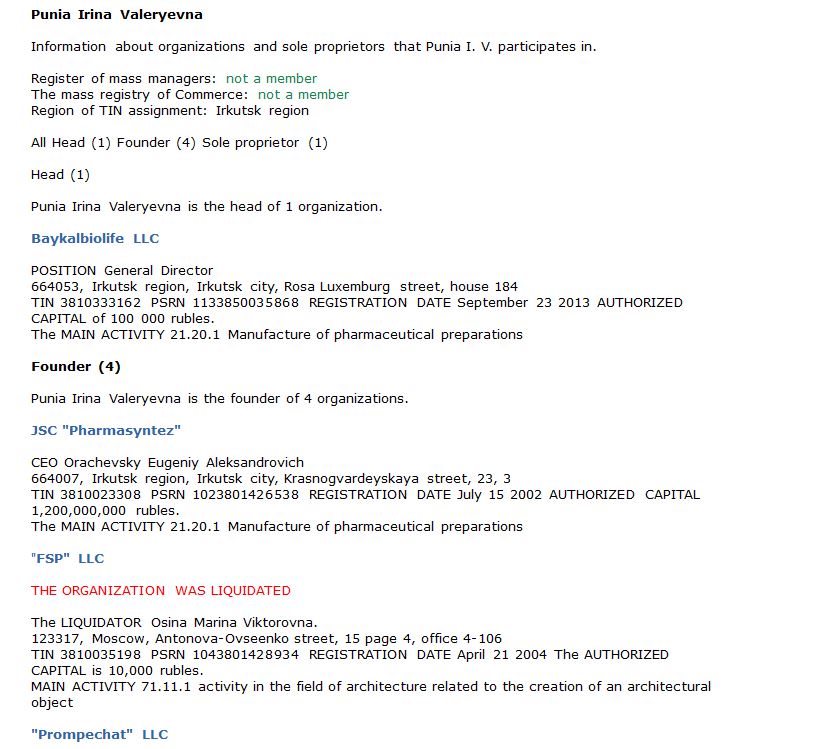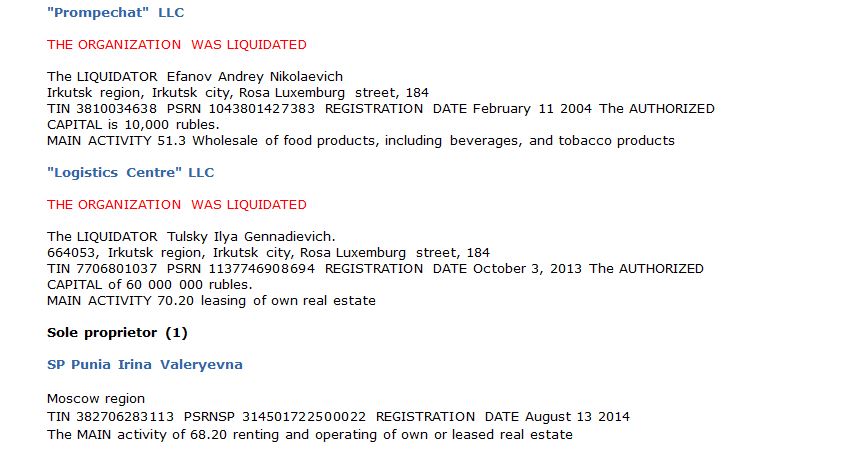Does Dr. Vikram Punia use only "pseudo-medicine" - both among firms for possible withdrawal of money abroad, and even among the medicines he produces for the treatment of Russians?
VTB Bank issued 2 billion rubles to JSC Pharmasyntez-Nord - a member of the Pharmasyntez group of companies - for the construction of the second stage of the plant of anti-cancer medicine. It should be recalled that President of JSC Pharmasyntez Vikram Punia Singh comes from India, he acquired Russian citizenship during his stay in our country. And he became a very wealthy man, taking into account not only his medicinal income, but also the collection of very expensive cars, among which there are the most refined models.
The revenue of JSC Pharmasyntez-Nord at the end of 2019 was more than 777 million rubles. Today, the portfolio of Pharmasyntez GC, which combines production facilities in 5 cities, includes more than 170 types of medicines for the treatment and prevention of HIV, tuberculosis, cancer, and diabetes.
The new production line will be located at the Novoorlovskaya site of the Saint Petersburg special economic zone.
Looking ahead, it is rather surprising: Mr. Punia does not get out of scandals. A native of the motherland of Indira Gandhi has long been called "Indian Ostap Bender" behind his back. But this Bender-Punia enjoys huge support from the Ministry of Industry and Trade. And it seems that he has established ties with the Ministry of Health of the Russian Federation. By the way, established at the time when the Minister was Tatyana Golikova, who is also called "madame Arbidol". Is it in these connections that Punia Singh's success lies?
A correspondent of The Moscow Post tried to study this delicate issue.
State contracts for 2 billion rubles
Let us recall some interesting facts from the life of the Indian Combinator: Vikram Punia Singh graduated from Irkutsk medical Institute. Then he worked as a doctor in Irkutsk... And there he started his own pharmaceutical business.

Today, JSC Pharmasyntez covers half of the Russian market of anti-tuberculosis medicine and a third of the market of anti-retroviral medicine against HIV. All the companies of the enterprising Vikram Punia are his private property. The annual turnover of Pharmasynthesis exceeds 10 billion rubles, and Mr. Punia himself is engaged in collecting expensive cars. There are: Ferrari, Lamborghini, Bentley, Rolls-Royce, Mercedes-Maybach in his garage.
But what are the principles of Punia Singh's business? May there be a "corruption" component? It is known that in order for a medicine from abroad to enter the Russian market, a permit document from the Ministry of Health of the Russian Federation is required. How does Mr. Punia acquire such securities?

Former Minister of Health of the Russian Federation Tatyana Golikova
As they say, words hurt more than swords, Mr. Punia has long known from which porch to enter the Ministry of Health since the time of Tatyana Golikova. And the proof of this is more than 180 signed state contracts worth more than 2 billion rubles.
This is the number of state contracts concluded by JSC Pharmasyntez in recent years. It was reported by The Moscow Post.
The company's revenue and profit are growing exponentially. In 2015 - 6.3 billion rubles, in 2016 – 8.6 billion rubles, and in 2017 - 10 billion rubles! The profit is also increasing: in 2015 - 295 million rubles, in 2016 - 1 billion, in 2017 – 2.2 billion rubles!
Is it because of the orders of the Ministry of Health that the office of Mr. Punia lives so luxuriously? And does Tatyana Golikova have an interest here?
Let's have a look at a specific example.
Medicine for cancer patients
The Pharmasyntez company wants to sign an agreement for the production of a medicine that has proven itself in Russia. And this medicine was created by some Western pharmaceutical company.
This company is the intellectual property owner of the medicine. And Mr. Punia is starting production of this medicine in Russia.
It is about the agreement between St. Petersburg Pharmasyntez and Irkutsk Pharmasyntez (owner of the latter is Vikram Punia). Pharmsyntez, with its plant in the Leningrad region, is the head company of Xenetic Biosciences Incorporated (USA) and Kevelt AS (Republic of Estonia). This was reported by The Moscow Post.
These companies are the developers of the most perspective medicines that are sold in the US and EU countries.
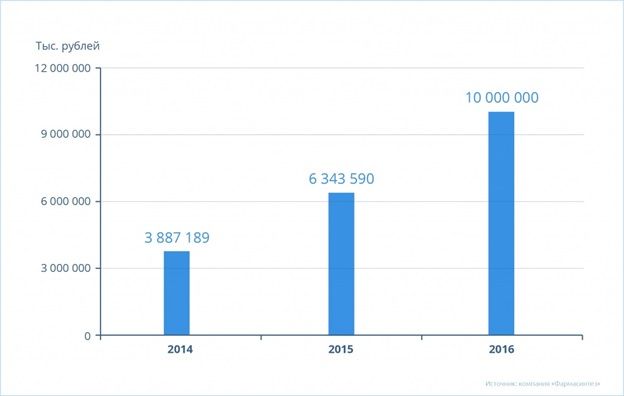
Profit dynamics of the Pharmasyntez company
And these developers that have their own pharmaceutical plants, sold the rights to produce the medicine of the palliative care action named Sehydrin during three years. This medicine helps cancer patients in the third and fourth stages of the disease.
The transaction amount is 668 million rubles, which is a drop in the ocean considering the number of cancer patients in Russia.
Today there are 540 thousand cancer patients in Russia, and almost half of them are in the late stages. That is, the state, represented by the Ministry of Health, will definitely purchase Sehydrin from the manufacturer for 250 thousand patients. But is it guaranteed? Apparently, depending on which manufacturer? May it be the one who is "nicer" for the officials?
Is Vikram Punia's JSC Pharmasyntez one of them? No doubt.
Today, Vikram Punia is listed as the founder of 11 companies. He started a pharmaceutical business with his partner Ruslan Polyakov, after he married his partner's sister, Irina.
Today Irina Valeryevna Punia is the CEO of her husband's two companies - BСS LLC and Baikalbiolife LLC. This was reported by Journalistic Control.

Irina Punia
Irina Punia also owns Pharmstroiproekt LLC.
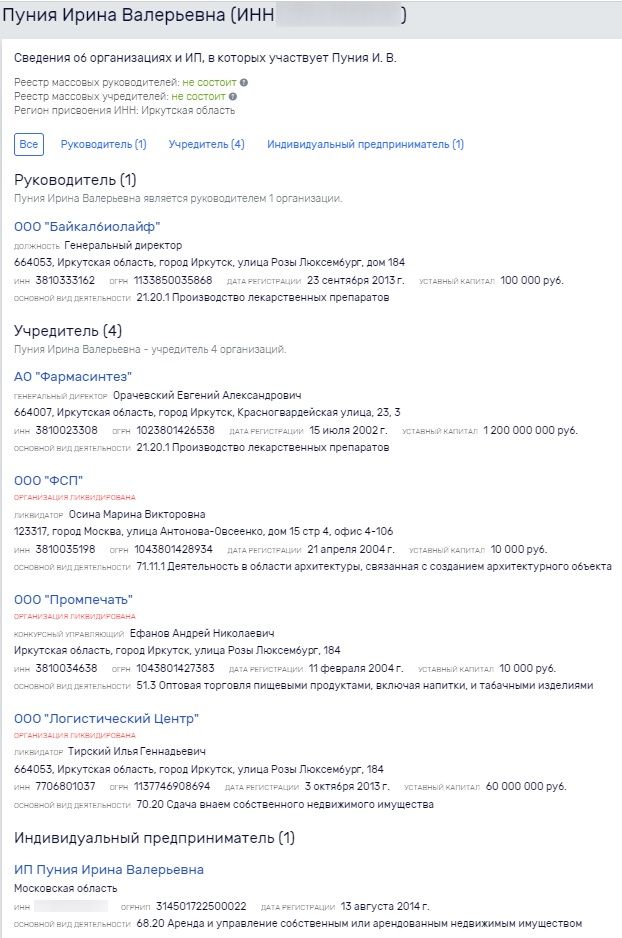
Freelance skipper
Thus, Irina and Vikram Punia currently own 11 pharmaceutical companies in Irkutsk, Moscow, Bryansk, St. Petersburg and Primorye. These enterprises are mainly engaged in the production of generic medicines.
The low price of a generic medicine is due to the lack of development costs, clinical trials, licensing fees and other expenses.
And since generic medicines are cheaper than the original ones, they are in great demand in poor countries.
The main problem with generic medicines is that they only copy the chemical composition of the original medicine. However the production technology, its purity, and the methods used by generic medicines are as cheap as possible.
And since Vikram Punia at one time, apparently, "dug" the way to the Ministry of Health of the Russian Federation, the Department began to buy generic medicines in huge batches.
At the same time, it does not matter what exactly the medicine treats! Mr. Punia said in one of the interviews that the medicine for tuberculosis produced by his company and sold in millions of packages a year, Perhloson has and will always have a postscript in small letters in the instructions "the action mechanism of the medicine is not completely clear". Babr 24 writes about this.

The entire Punia's business is based on Indian generic medicine manufacturing technologies. And here, in Russia, generic medicines are several times more expensive than in India. And Vikram Punia is, indeed, very closely connected to ex-Minister Tatyana Golikova.
It was under Golikova that the Perhloson medicine was promoted to the Russian market. This was reported by RBC.
At the same time, Perhloson is harshly criticized by phthisiologists: this medicine has a heavy tolerance, many side effects and a very high price.
But no one withdraws this medicine from sale. What about the nation's health? Does this issue concern the Ministry of Health of the Russian Federation?
Intermediaries from offshore companies
Recently, there have been more and more scandals surrounding the name of Mr. Punia Singh.
In September 2018, the Pharmasyntez company was accused of non-payment of taxes in the amount of 190 million rubles. The case was initiated by the Investigative Body of the IC from the Irkutsk region. This was reported by Journalistic Control.

As the investigation showed, representatives of the Pharmasyntez company concluded fictitious contracts for the purchase of raw materials from foreign contractors with offshore intermediary firms.
But in fact, intermediaries from offshore companies did not deliver anything. Later, JSC Pharmasyntez was accused of another fictitious transaction in order to avoid paying taxes. This case involved a certain Region Stroyservice company.
According to the documents, this office was a counterparty of JSC Pharmasyntez, but in fact it was not, and did not supply goods. It didn't provide any services...
What was the outcome of all these proceedings?
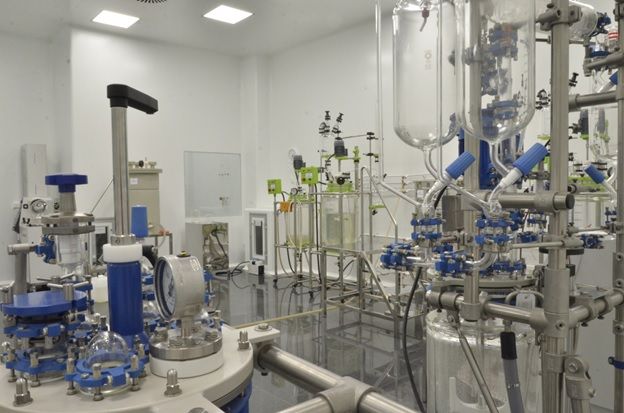
In September 2018, the Pharmasyntez company was accused of non-payment of taxes in the amount of 190 million rubles. The case was initiated by the Investigative Body of the IC from the Irkutsk region.
All investigative actions were put on the brakes. Mr. Punia Singh continued to pursue his pharmaceutical business, which should have been the focus of Federal investigations.
The Janssen company against Pharmasyntez
Another scandal. Punia's company registered an analog of the HIV medicine - Rilpivirinum, the patent for which belongs to the Janssen company. The patent will expire only in 2027.
The Janssen company has appealed to court with the claim towards JSC Pharmasyntez. This is written by The Moscow Post.
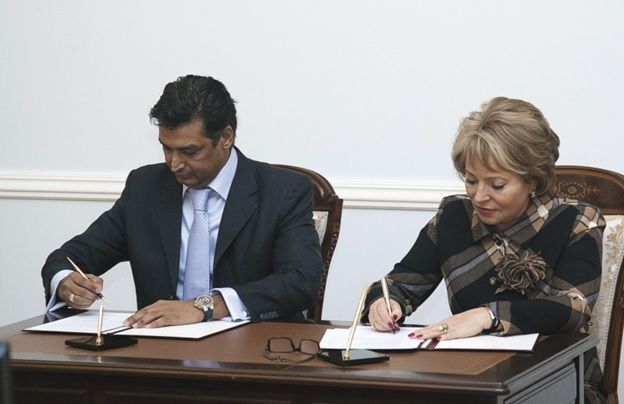
In recent years, JSC Pharmasyntez has earned more than 2 billion rubles on state orders
But soon Punia's company was again involved in a patent infringement scandal.
The reason for the new scandal was a lawsuit filed by the Argentine pharmaceutical company Tuteur S. A. C. I. F. I. A. The lawsuit was submitted to the arbitration court of St. Petersburg and the Leningrad region in early 2018. This was reported by Journalistic Control.
The claim for 855.7 million rubles was about protecting the exclusive right to the medicine named Capecitabinum. The patent for the active substance had already passed, but the lawsuit was about the method of production of this anti-cancer medicine.
The company that filed the lawsuit received a patent from the Eurasian Patent Organization for a method of obtaining a pharmaceutical composition in solid medicinal form: for the production of a specific form of medicine that made it much more effective.

In recent years Vikram Punia has acquired 3 more pharmaceutical plants
But someone is helping Mr. pharmacist with Indian roots put out all the scandals and sign peace agreements at the trials. But why?
Coronavirus: new billions
And although Tatyana Golikova is no longer in the Ministry of Health, Vikram Punia is thoroughly supported by representatives of Madame Arbidol.
In January 2020, suddenly there was a certain recommendation of the Ministry of Health of the Russian Federation to use the medicine Kalidavir (a generic medicine of the American one Kaletra for HIV patients), for the treatment of coronavirus infection. This was reported by RBC.
Where did this recommendation suddenly come from?
After all, at that time in Russia there were no cases of coronavirus, there was no practice of its treatment, and even more so, there were no clinical trials.
The medicine Kalidavir is a combination of two substances that are believed to help stop the development of HIV: Lopinavir and Ritonavir.
And, of course, Kalidevir is produced only at the factory of Pharmasyntez in Irkutsk.
But can Kalidevir treat coronavirus? This is unknown. And to understand this, it takes years of clinical trials. Besides, Kalidavir has a huge list of contraindications.
However the Ministry of Health is pushing Temporary recommendations issued in January 2020 to everybody. And, most likely, it is Kalidavir that is planned to be used for the treatment of coronavirus. But famous pseudo-medicine from Golikova - Arbidol has already been in the list of Russian medicine from coronavirus. However, it provoked a very loud scandal.
In 2017, Punia has already performed a certain operation, as a result of which the Russian Ministry of Health refused to purchase the original American medicine for HIV - Kaletra (worth more than 5 billion rubles a year). The Ministry of Health started purchasing generic medicine of Kalidavir from Punia Singh.
Today, the company of Punia operates and earns primarily on the sale of medicines to Russian hospitals: at the end of the year, JSC Pharmasyntez became the sixth largest manufacturer of medicines in this segment, taking 3.2% of the market. This is reported by RBC.
The rate of import substitution also helped to rise in the rating: in 2015, the Russian Government approved restrictions on state purchases of imported medicines: the state program "Pharma-2020" is aimed at replacing expensive foreign medicines.
Over the past 3 years, there appeared three new factories of Punia Singh.
In 2015, Vikram Punia acquired YugraPharm company in Tyumen for 500 million rubles. And established the production of medicines for diabetes. In 2017, he opened the production of cytostatics (antitumor medicines) in St. Petersburg and Bratsk.
"My main dream is to develop innovative medicines," the great Combinator admitted in one of his interviews. This was reported by RBC.
But about 95% of the names in the portfolio of JSC Pharmasyntez are generic medicines. As innovative medicine, there is Perhlozone, medicine against tuberculosis, against which doctors-phthisiatricians strongly oppose.
But Perhlozon still went on a free voyage, thanks to the constant care of Mrs. Golikova.
So how much "pseudo-medicine" from Dr. Punia Singh does the country consume now?


.jpg?v1597217105)
.jpg?v1597217105)
